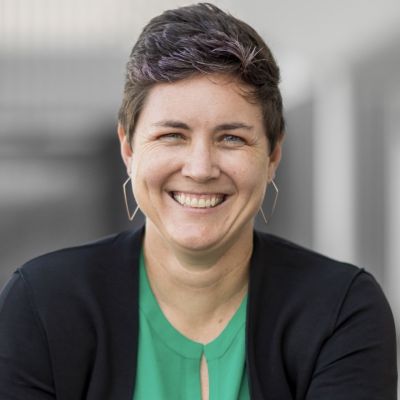
Danielle Collins
Academy for the Performing Arts
Huntington Beach High School
Huntington Beach, California
The Music, Media, Entertainment Technology (MMET) Program at Huntington Beach Academy for the Performing Arts is personalized and student-led, “meaning our students choose a path for the year (or sometimes even the show), and each is responsible for different aspects of the production, beyond performing the songs,” says Danielle Collins, the director of the MMET department.
About 25% of the 150 students in the Pop Music Program in MMET help arrange or record their colleagues’ original songs. According to Collins, students run rehearsal blocks and sound engineer in each of the academy’s studios, as well as oversee production of each song in preparation for live performances, which include three annual mainstage rock shows (each with 12 to 15 groups performing) and three to four dozen community gigs and performances. Through community outreach by Collins and her students, MMET performances run the gamut from holiday parties, parades, street fairs, restaurants and coffee shops, and other events in Huntington Beach.
“We try to provide students as many options as they may find in the music industry, while still maintaining a level of quality,” she says. These options include recording holiday albums and original songs for which media students design music videos. “We focus on producing, recording, performing and event managing,” Collins says.
According to one of her nomination letters, Collins encourages students to try, fail and eventually succeed. Calling MMET a “program of grit,” Collins says that students hold themselves to such a high standard that failure usually isn’t an option. “We create safe opportunities for healthy fails and the space and time built into productions to recover and succeed,” she explains. “We reflect weekly and ask students to recast what they may feel is a ‘fail’ to merely a ‘try,’ and this mindset helps our students take more risks because they know they’ll be supported through the process.”
In addition to running the Pop Music Program at her school, Collins helps other music educators establish their own programs. She shares that at a previous school, she started her pop music groups during every ensemble class — for example, jazz band had a rhythm section, and those students were given class time to select and rehearse pop songs to perform. She recruited students into concert band classes, planning to have them in the pop music group. According to Collins, this initial enrollment is vital while building your program.
Collins also says that you must have your administration’s support in understanding that not all students on campus have an interest in participating in a traditional music program. “You will absolutely triple your program if you can create space for the other 80% of students on your campus who find passion in popular music.”








